
CCH expands educational horizons in Indonesia with key partnership
JAKARTA, Indonesia – In a significant move to expand educational opportunities in Indonesia, the College of Contemporary Health’s (CCH) Dzidek Sabat has successfully forged a new path of collaboration with one of Indonesia’s most prestigious educational institutions. During his recent visit, Dzidek met with officials from the Makara UI Academy, a division of the esteemed University of Indonesia (UI), the UI Faculty of Nursing, and representatives from the Indonesian Nurses Association Educational Institution. These meetings highlighted a shared vision for educational advancement and underscored the importance of global partnerships in enriching learning experiences.
The visit reached a remarkable milestone with the signing of a Memorandum of Understanding (MOU) between CCH and the University of Indonesia. This gala event marked the beginning of a significant collaboration, wherein CCH will provide its cutting-edge online training courses to Indonesian learners. This agreement opens up new avenues for students and professionals in Indonesia to access CCH’s renowned online educational resources, thus bridging geographical barriers and fostering a more interconnected world of knowledge and skills.
Further deepening this educational exchange, Dzidek engaged in an enriching all-day workshop with the staff of Makara UI Academy. This session focused on the exchange of online course development expertise and best practices, setting the stage for a robust and dynamic educational partnership. Such interactions not only enrich the educational fabric of both organisations but also pave the way for innovative learning solutions tailored to the evolving needs of students globally.
This partnership is a testament to CCH’s commitment to extending its educational reach and impact, while also enriching the learning landscape in Indonesia. It’s a step towards a future where education knows no bounds, and learning is a shared, global journey.
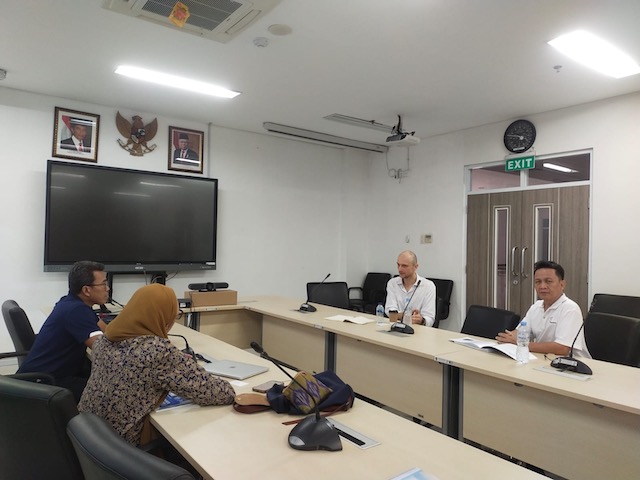


About the College of Contemporary Health (CCH):
CCH is a leader in online education, providing top-tier learning resources across various disciplines. With a focus on making high-quality education accessible, CCH continues to break new ground in online learning, fostering academic excellence and innovation worldwide.
Contact:
Nicholas Feenie
Business Development Manager
College of Contemporary Health Ltd.
nicholas.feenie@contemporaryhealth.co.uk
+44 (0)20 3773 4895
www.contemporaryhealth.co.uk
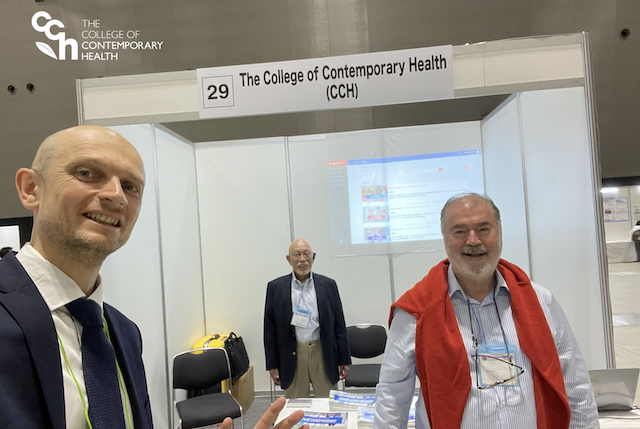
CCH Participates in Independent Ageing Expo and Convention 2023 in Japan
John Feenie, CEO, and Dzidek Sabat, Product Development Manager, attended the Independent Ageing Conference in Aichi, Japan, in mid-October. The Expo attracted over 950 delegates worldwide, drawn to Aichi by Japan’s leadership in various aspects of dementia care, both clinical and societal.
CCH, initially focused on courses in obesity care and, more recently, digital health, has formed a partnership with the National Center for Geriatrics and Gerontology in Obu City, Aichi Prefecture, Japan. Together, they have created an online course in the Japanese language, aimed at fostering the development of multidisciplinary teams in dementia care for hospitals across Japan. This marks CCH’s first foray into dementia care training, with plans to expand its mission to provide courses on the subject in many countries, particularly in Asia.



About the College of Contemporary Health (CCH):
CCH is a leader in online education, providing top-tier learning resources across various disciplines. With a focus on making high-quality education accessible, CCH continues to break new ground in online learning, fostering academic excellence and innovation worldwide.
Contact:
Nicholas Feenie
Business Development Manager
College of Contemporary Health Ltd.
nicholas.feenie@contemporaryhealth.co.uk
+44 (0)20 3773 4895
www.contemporaryhealth.co.uk
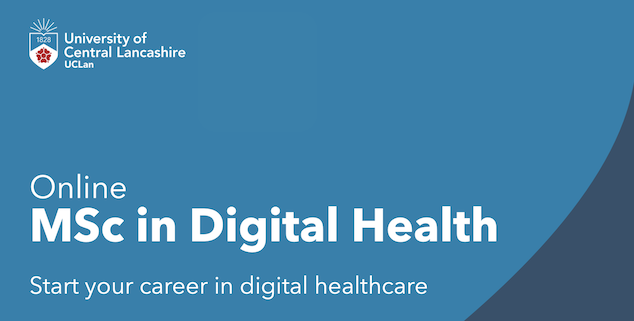
PGCert, PGDip, and MSc in Digital Health launched
The College of Contemporary Health (CCH) has been involved with the development of University of Central Lancashire’s (UCLan) new postgraduate programme in Digital Health. The programme, Master of Science (MSc) in Digital Health, is designed to provide students with a comprehensive education in the use of technology in healthcare. The flexible design enables the student to exit the programme with either a Postgraduate Certificate (PGCert), or a Postgraduate Diploma (PGDip) in digital health.
The programmes will cover key areas such as telemedicine, artificial intelligence, and the use of wearables in healthcare. Students will have the opportunity to develop a deep understanding of the ways in which digital technologies can improve the delivery of care and enhance patient outcomes. The coursework will be delivered by experienced professionals from the healthcare and technology industries, providing students with a unique blend of academic and practical expertise.
The MSc programme is aimed at doctors, healthcare professionals, and other individuals who wish to specialise in digital health. The PGCert and PGDip programmes are designed for those who want to develop a more general understanding of the field and gain a solid foundation in the use of technology in healthcare.
The launch of these new programmes reflects CCH’s commitment to providing high-quality education and training in digital health. CCH aims to equip students with the skills and knowledge they need to make a positive impact in the field of digital healthcare, an exciting and rapidly developing field that will present graduates with a vast array of opportunities going forward.
All awards will be awarded by the University of Central Lancashire (UCLan).
Read More
Meet Mel Idroos, CCH PGDip Graduate!
Meet Mel Idroos, PGDip in Lifestyle Medicine (Obesity Care) graduate!
Having completed one of our CPD Short Courses in 2015, Mel decided to expand upon her new knowledge base by taking the plunge and beginning her postgraduate studies with the College of Contemporary Health (CCH).
Beginning in September of 2020, with the ambitions of deepening her knowledge of obesity and enhancing her clinical practice, Mel graduated from CCH in September of 2022 with a Postgraduate Diploma (PGDip) in Lifestyle Medicine (Obesity Care) with Merit.
Since her graduation, Mel has already begun to put what she’s learned into practice developing and delivering Tier 2 adult weight management services, making a meaningful impact in the lives of her patients with obesity.
Here we have interviewed Mel about the impact she is making with her Postgraduate Diploma from CCH:
Q: Hi, Mel! Where do you work at the moment?
A: I work for a Community Interest Company. We are contracted by the local county council to deliver a Tier 2 adult weight management service.
Q: What profession do you work in?
A: I work in the Well-being directorate. As well as adult weight management we deliver a range of health and well-being services to the local population.
Q: Who are some of the patients you assist on a day-to-day basis?
A: We see a wide range of clients in our weight management service. Almost all have a long-term condition associated with excess weight and have tried multiple approaches to lose weight over many years.
Q: What percentage of your patients have overweight or obesity?
A: All clients who come to the service, either as a self-referral or through an HCP referral, have overweight or obesity. The average referral BMI is 36.
Q: What inspired you to study Lifestyle Medicine (obesity care)?
A: I wanted to deepen my knowledge of obesity and enhance my clinical practice as well as cascading what I have learnt to our team of practitioners.
Q: Why did you choose CCH?
A: Working full-time I was attracted to the flexibility of CCH’s online learning. I particularly enjoyed the variety of module options offered. Paediatric Obesity’ and ‘Obesity and Reproductive Health’ were 2 modules that offered entirely new areas of study for me

Q: How did gaining your PGDip at CCH enhance the care that you provide to your patients?
A: I used the information gained through studying the PGDip to enhance and augment our core programme ‘My Weight Matters’. I was able to write new content for the course covering topics not previously included. Sleep, stress, mindful eating practices and social support are just some of the information I was able to add. The course’s behaviour change and psychological aspects were valuable in enhancing the quality of our 1-1 and group interventions.
Q: What has changed most in your practice since starting your studies?
A: The course has given me more confidence to answer those tricky and complex questions that clients often ask!
Q: What is one of the biggest takeaways you gained from your PGDip as a health professional?
A: The topic of weight stigma really struck a chord with me. I have an idea for a piece of work in this area and hope to implement this across our service very soon.
Q: Would you encourage other health professionals to pursue a PGDip with CCH?
A: I would absolutely encourage other health professionals to pursue this course. Much of what I have learnt I have already put into practice.
Q: What is the main reason you would recommend CCH courses to your colleagues?
A: I would recommend this course due to the high-quality materials offered to engage with, and the diversity of topics covered. The tutor support is excellent. The online, flexible approach was also highly-valuable to me.
The College of Contemporary Health, with the University of Central Lancashire Medical School, offers the first, and only, fully online postgraduate qualifications (PGCert/PGDip/MSc) in Lifestyle Medicine (Obesity Care) not just for UK based students, but for students across the world.
We offer 3 student intakes per year starting in January, May, and September.
Click here to apply: Apply for a Postgraduate Qualification in Lifestyle Medicine (Obesity Care).
Read More
Meet CCH PGDip Graduate, Shaimaa Alasfour!
Shaimaa graduated from CCH in 2020 with a Postgraduate Diploma (PGDip) in Obesity Care and Management (now Lifestyle Medicine). Since her graduation she has found fulfilment and happiness working at a health center, using her specialist training in obesity care to make a meaningful impact in the lives of her patients with obesity. Here we have interviewed her about the impact she is making with her postgraduate qualification from CCH.
Q: Hi, Shaima! Where do you work at the moment?
A: At the moment I work in the state of Kuwait, at the Al Nuzha Health Center.
Q: What profession do you work in?
A: I’m currently a consultant in family medicine at MRCGP International, and I specialise in obesity medicine and management as more of a subspecialty.
Q: Who are some of the patients you assist on a day-to-day basis?
A: On a day-to-day basis I deal with many different patients with a variety of diseases from acute to chronic, and also non-communicable conditions which affect all different age groups and ethnicities.
Q: What percentage of your patients have overweight or obesity?
A: It is well known that Kuwait has the highest prevalence of obesity in comparison with other regions in the Gulf. Also, obesity has a significant association to other chronic conditions such as diabetes melitus, hypertension, and so on. I can’t say definitively what percentage of my patients have an abnormally high BMI, but I would say it is more than 75-80% of them that do, and 90% of those patients have some sort of chronic disease from obesity which is why they’re visiting the clinic.
Q: Why did you choose to study obesity care and management?
A: You will be surprised to know that my first choice was to study geriatric care, but luckily, God chose the right path for my career and that was to help and assist with many people, but especially those who have undergone bariatric surgery, and children with obesity, many of whom suffer in silence. During the Covid-19 lockdowns, everyone was affected either mentally or physically, but I felt that children were most significantly affected, especially with weight regain. That is why I have become more focused on children. I want them to live normal and healthy lives without the risk of cardiovascular disease that childhood obesity can bring about.
Q: Why did you choose CCH?
A: There were many important reasons behind my decision to study with CCH. Firstly, I knew CCH could really increase my knowledge in this area, but I also knew they could help enhance my clinical skills as well. Upon studying with CCH, I really noticed an improvement in my critical thinking skills, and also how significantly improved my writing skills became!
Q: How did gaining your PGDip at CCH enhance the care that you provide to your patients?
A: I noticed positive changes during my fellowship in obesity management with Imperial College London especially at the multi-disciplinary team meetings and daily clinic attendance. It also increased my interest in childhood obesity.
Q: What is one of the biggest takeaways you gained from your PGDip as a health professional?
A: My PGDip has made me a lot more confident when treating people with obesity, and it’s also given me a real passion to do it as well!
Q: Would you encourage other health professionals to pursue a PGDip with CCH?
A: Yes, definitely! I would encourage anyone who is interested to go ahead and learn about the mystery of obesity and enrol with the CCH. You’ll start with the basics, and believe me, you will never want to stop until you’ve covered all aspects of obesity!
The College of Contemporary Health, in partnership with the University of Central Lancashire Medical School, offers the first, and only, fully online postgraduate qualifications (PGCert/PGDip/MSc) in Lifestyle Medicine (Obesity Care) not just for UK based students, but for students across the world, like Shaimaa in Kuwait.
We offer 3 student intakes per year starting in January, May, and September.
Click here to apply: Apply for a Postgraduate Qualification in Lifestyle Medicine (Obesity Care).
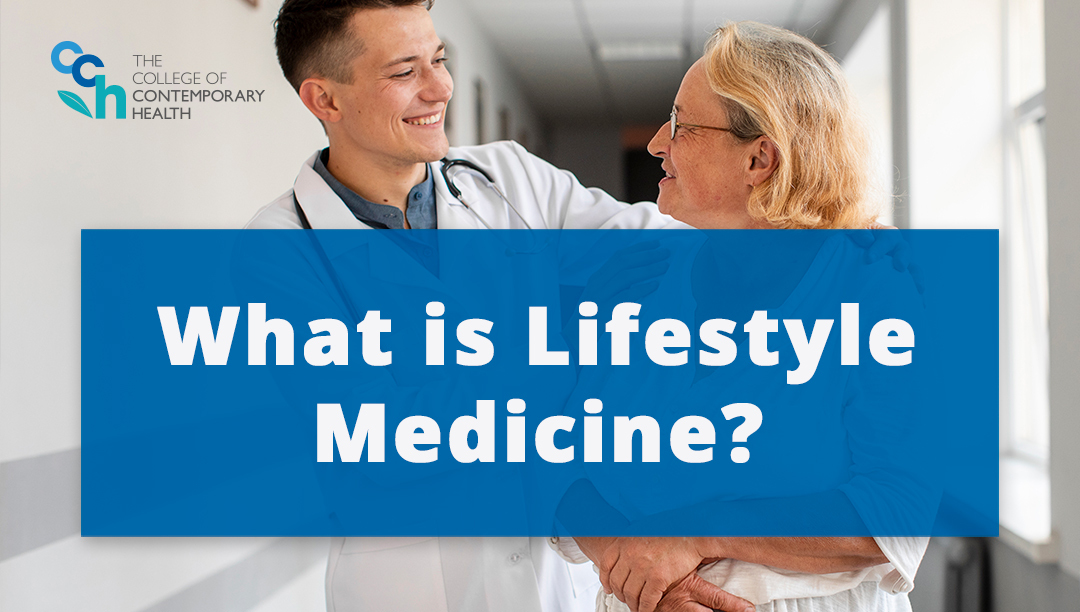
What is Lifestyle Medicine?
Obesity, along with many other non-communicable diseases, is the result of a complex range of factors, many of which relate to lifestyle, and are underpinned by physical, emotional, environmental and social determinants.
Lifestyle medicine (LM) seeks to address these underlying issues to improve the health and wellbeing of individuals and societies. LM offers healthcare professionals and patients a powerful tool for obesity prevention and treatment. LM is not, on its own, the answer to the obesity crisis, but for most people it will be part of the solution.
Lifestyle medicine is an evidence-based approach to educating, guiding and supporting individuals and populations to make positive behaviour changes, with:
A focus on:
- healthy eating
- physical activity
- stress management and
- adequate sleep.
It also emphasises the importance of good mental health and interpersonal relationships, and the individual’s home and community environment.
Lifestyle medicine recognises the need for, and the continued importance of, other therapeutic interventions for obesity, including pharmaceutical and surgical, where appropriate.
The College of Contemporary Health, in partnership with the University of Central Lancashire Medical School, offers the first, and only, fully online postgraduate qualifications (PGCert/PGDip/MSc) in Lifestyle Medicine (Obesity Care) not just for UK based students, but for students across the world.
We offer 3 student intakes per year starting in January, May, and September.
Click here to apply: Apply for a Postgraduate Qualification in Lifestyle Medicine (Obesity Care).
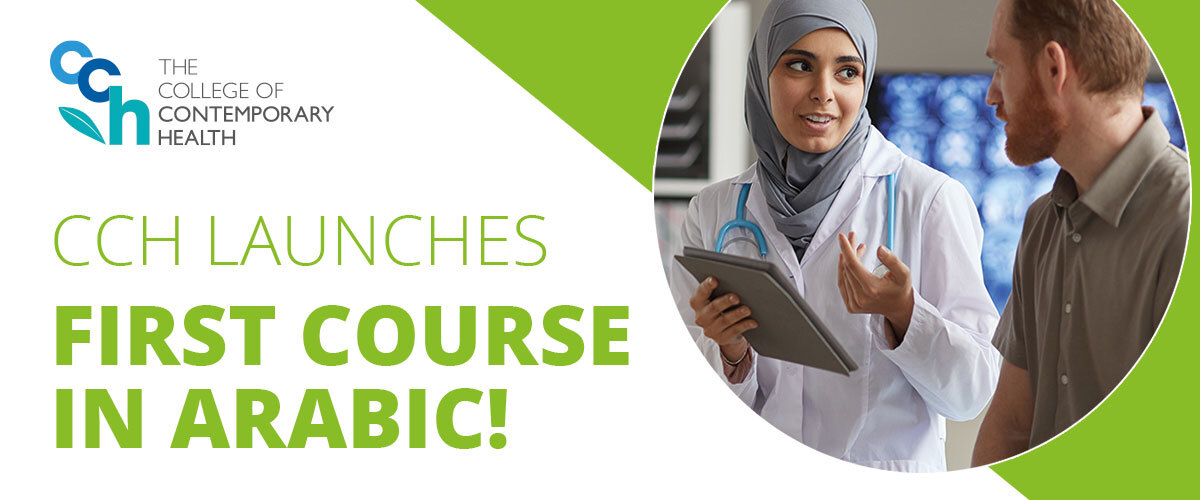
CCH Launches First Course in Arabic!
THE COLLEGE OF CONTEMPORARY HEALTH, LONDON, LAUNCHES FIRST COURSE IN NUTRITION AND WEIGHT MANAGEMENT IN ARABIC IN PARTNERSHIP WITH UNITED AMERICAN EXPERTISE, CAIRO
The College of Contemporary Health (CCH) is pleased to announce the launch of its highly acclaimed fully online CPD short course, Nutrition and Weight Management Essentials, in Arabic, in association with its Middle Eastern partner, United American Expertise (UNAMEX).
This is a first for CCH in having one of its flagship courses made available to healthcare professionals in the region and intends to make all of its courses in obesity and weight management available in Arabic.
“In 2020, CCH was approached by UNAMEX’s Cairo branch, a long established company in the region prominent in introducing pharmaceutical and healthcare services to the Middle East where there is a major healthcare problem with obesity and its comorbidities including Type-2 diabetes, high blood pressure, chronic heart disease, lipedema, many types of cancer, and osteoarthritis” said John Feenie, Founder and CEO of CCH. “Obesity is out-of-control in many Middle Eastern countries, and unfortunately, as in many Western countries, healthcare professionals locally have been inadequately trained to deal with the problem. This course, newly available in Arabic, Nutrition and Weight Management Essentials, provides a strong basis for healthcare professionals to gain the knowledge necessary to help rectify this deficiency. The arrival of the Covid-19 pandemic has brought this deficiency in training into sharp focus as there is clear evidence of a strong link between obesity, its comorbidities, and vulnerability to Covid-19 infection”, he added.
Obesity is out-of-control in many Middle Eastern countries, and unfortunately, as in many Western countries, healthcare professionals locally have been inadequately trained to deal with the problem. This course, newly available in Arabic, Nutrition and Weight Management Essentials, provides a strong basis for healthcare professionals to gain the knowledge necessary to help rectify this deficiency.”
“UNAMEX has a long history of introducing advanced products and services from Western countries to the Middle East via our Cairo office”, said Dr. Khaled Sharaf, General Manager. “In recent years we have concluded that the continuing professional development (CPD) of our healthcare professionals would be an area of opportunity for us, and we decided that our initial venture into this area should be in the rapidly evolving field of obesity care where we learned that CCH, based in London, was a leader in the field. We were especially attracted to their strong capability in online learning as well, which affords busy doctors and other healthcare professionals the time and convenience needed to acquire new knowledge and skills. We have since worked closely together to bring this course to a new audience in Arabic and we are very proud to do this”, Dr. Sharaf added.
The College of Contemporary Health, is located in London and since its establishment in 2013 has been a pioneer in the introduction of advanced online academic and continuing professional development short courses in obesity care and weight management, digital health and behavioural change therapies.
UNAMEX was established in Chicago, Illinois in 1981. In 1982, a new branch was established in Cairo, Egypt. Then, in 2006, another branch was established in Hong Kong. UNAMEX is a consultancy firm specialised in the pharmaceutical & healthcare sector focussing mainly on the Europe & Middle East regions. UNAMEX staff are top eminent professionals in the healthcare sector with extensive experience in consultancy & market research projects.
For further information please contact:
Nicholas Feenie at:
Email: nicholas.feenie@contemporaryhealth.co.uk
Phone: +44 (0)20 3773 4895
Dr Khaled Sharaf at:
Email: info@unamex.us
Phone: +201151288333

كلية الصحة المعاصرة (CCH) بلندن تطلق أول دورة في التغذية وإدارة الوزن باللغة العربية بالشراكة مع الشركة الأمريكية المتحدة للخبراء (UNAMEX)، القاهرة
يسر كلية الصحة المعاصرة (CCH) أن تعلن عن إطلاق دورة عبر الإنترنت في التطوير المهني المستمر CPD “أساسيات التغذية وإدارة الوزن” باللغة العربية، بالتعاون مع شريكها في الشرق الأوسط، الشركة الأمريكية المتحدة للخبراء (UNAMEX).
وهذه هي المرة الأولى التي تقدم فيها كلية الصحة المعاصرة (CCH) إحدى دوراتها الرئيسية المتاحة للعاملين في مجال الرعاية الصحية في المنطقة، وتعتزم جعل جميع دوراتها في السمنة وإدارة الوزن متاحة باللغة العربية.
وقال جون فيني، المؤسس والرئيس التنفيذي لشركةCCH : “في عام 2020، تم الاتصال ب CCH من قبل فرع UNAMEX في القاهرة، وهي شركة راسخة منذ فترة طويلة في المنطقة بارزة في تقديم خدمات الأدوية والرعاية الصحية إلى الشرق الأوسط حيث توجد مشكلة رعاية صحية كبيرة مع السمنة والأمراض المرتبطة بها بما في ذلك مرض السكري من النوع 2، وارتفاع ضغط الدم، وأمراض القلب المزمنة، والعديد من أنواع السرطان، وهشاشة العظام.”
“.السمنة خارجة عن السيطرة في العديد من بلدان الشرق الأوسط، وللأسف، كما هو الحال في العديد من البلدان الغربية، لم يتم تدريب المتخصصين في الرعاية الصحية محليا بشكل كاف للتعامل مع المشكلة. توفر هذه الدورة، المتاحة حديثا باللغة العربية، أساسيات التغذية وإدارة الوزن، أساسا قويا للعاملين في مجال الرعاية الصحية لاكتساب المعرفة اللازمة للمساعدة في تصحيح هذا النقص. وقد أدى وصول وباء كوفيد-19 إلى تركيز هذا النقص في التدريب بشكل حاد حيث أن هناك أدلة واضحة على وجود صلة قوية بين السمنة وأمراضها المشتركة والتعرض للعدوى في كوفيد-19″.
وقال الدكتور خالد شرف، المدير العام لشركة UNAMEX: “لدى UNAMEX تاريخ طويل في تقديم المنتجات والخدمات المتقدمة من الدول الغربية إلى الشرق الأوسط من خلال مكتبنا في القاهرة”. “لقد خلصنا في السنوات الأخيرة إلى أن التطوير المهني المستمر (CPD) للعاملين في مجال الرعاية الصحية لدينا سيكون مجالا للفرص بالنسبة لنا، وقررنا أن مشروعنا الأولي في هذا المجال يجب أن يكون في مجال رعاية السمنة المتطور بسرعة حيث علمنا أنCCH ، ومقرها في لندن، كانت رائدة في هذا المجال. وقد انجذبنا بشكل خاص إلى قدرتهم القوية في التعلم عبر الإنترنت أيضا، مما يوفر للأطباء المشغولين وغيرهم من المتخصصين في الرعاية الصحية الوقت والراحة اللازمين لاكتساب المعرفة والمهارات الجديدة. وقد عملنا منذ ذلك الحين معا بشكل وثيق لتقديم هذه الدورة إلى جمهور جديد باللغة العربية ونحن فخورون جدا بالقيام بذلك”.
تقع كلية الصحة المعاصرة في لندن، ومنذ إنشائها في عام 2013 كانت رائدة في إدخال دورات دراسية متقدمة على الإنترنت في مجال رعاية السمنة وإدارة الوزن والصحة الرقمية وعلاجات تغيير السلوك.
تأسست UNAMEX في شيكاغو، إلينوي في عام 1981. في عام 1982، تم تأسيس فرع جديد في القاهرة، مصر. ثم، في عام 2006، تم إنشاء فرع آخر في هونغ كونغ.
UNAMEX هي شركة استشارية متخصصة في قطاع الأدوية والرعاية الصحية تركز بشكل رئيسي على مناطق أوروبا والشرق الأوسط. موظفو UNAMEX هم من كبار المهنيين البارزين في قطاع الرعاية الصحية مع خبرة واسعة في مجال الاستشارات ومشاريع أبحاث السوق.
لمزيد من المعلومات يرجى الاتصال
نيكولاس فيني في:
البريد الإلكتروني: nicholas.feenie@contemporaryhealth.co.uk
الهاتف: +44 (0)20 3773 4895
الدكتور خالد شرف في :41 شارع الفلكى ، القاهرة
البريد الإلكتروني: info@unamex.us
الهاتف +201151288333:
Read More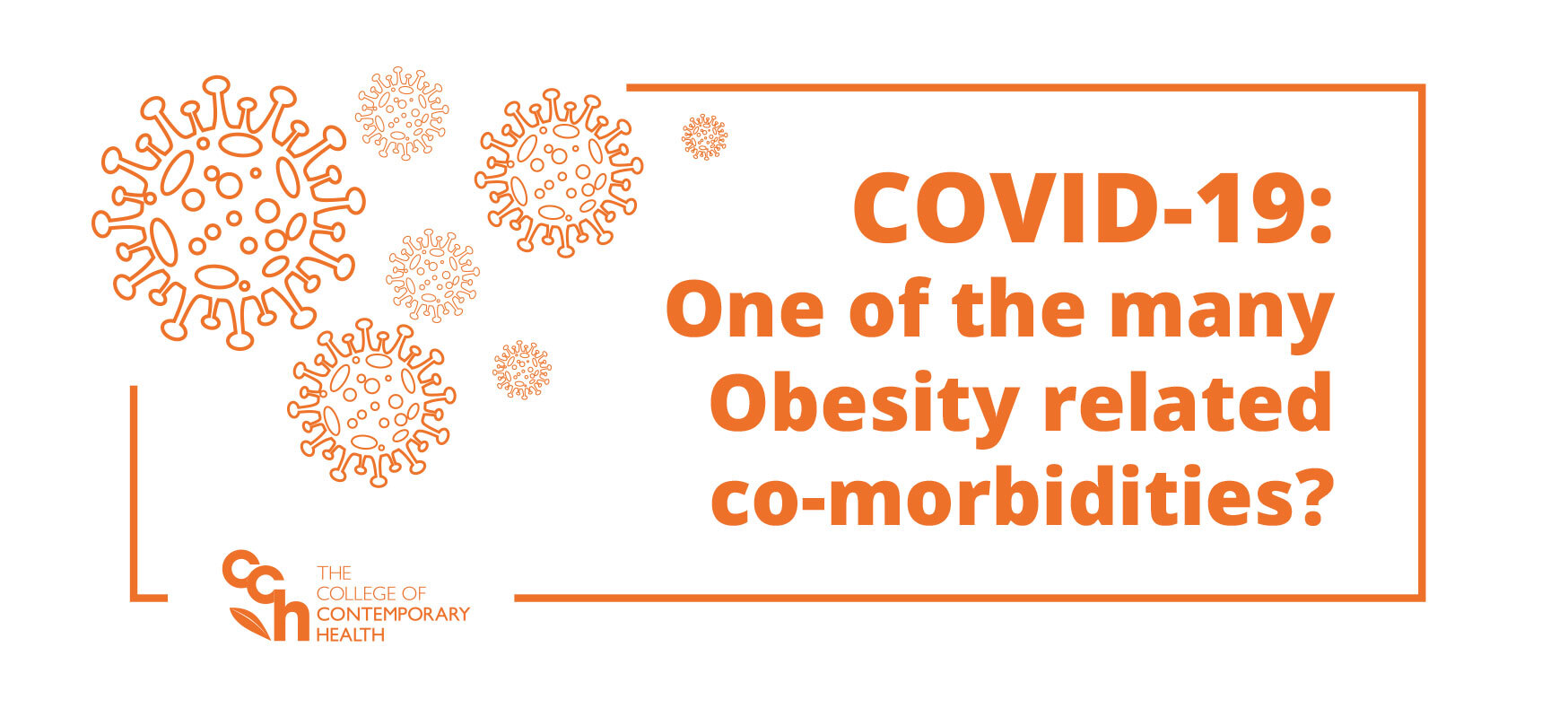
Covid-19: One of the many Obesity related co-morbidities?
Thousands of academic articles have been published on Covid-19 over recent weeks, reflecting the amount of data being generated and the importance of finding ways to fight the SARS-CoV-2 virus. The more we learn about the disease, the more complex it appears to be, with as many questions as answers arising (1). However, one aspect of the disease is now quite well established – the major risk factors that make individuals more susceptible to severe Covid-19 illness. After advanced age and male sex, the major risk factors are obesity and other, related underlying health conditions such as hypertension, cardiovascular disease (CVD), type 2 diabetes (T2D) and respiratory diseases (2).
Obesity is a major risk factor for CVD, T2D, hypertension and many other serious conditions, including a number of cancers, and its role in the development of these diseases is the reason it is such a major public health concern. However, Covid-19 has cruelly exposed another health issue associated with obesity – increased susceptibility to infections, particularly respiratory infections. Individuals with obesity often have respiratory dysfunction due to the presence of large fat deposits around the chest and upper abdomen. This is characterised by altered respiratory mechanisms, increased airway resistance, impaired gas exchange and low lung volume and muscle strength (3). As a result, obesity increases the risk of contracting respiratory tract infections including influenza and pneumonia (4, 5).
In the 2009 Influenza A H1N1 pandemic, patients with obesity were disproportionately affected by the virus, with more than twice the mortality rate of people with normal weight (6). Although this was an influenza virus, not a coronavirus, this should nevertheless have been a warning sign that people with obesity are likely to be at greater risk during viral respiratory pandemics. This warning was enhanced by a later study which looked at the response to the H1N1 vaccine. People with obesity initially produced high levels of antibodies, but within 12 months their antibody titres had dropped significantly, and they had double the risk of contracting the virus (7). This suggests that obesity compromises the immune system and its ability to fight viral respiratory infections.
In the case of Covid-19, it is most likely that the impact of obesity on the severity of the disease is due primarily to immune system dysfunction. A range of functional abnormalities have been identified in obesity, but in viral infections the dysfunction of Natural Killer (NK) cells is particularly relevant as they are important in both the initial stage of infection and then clearing the virally infected cells (8). The low-grade, chronic inflammation caused by excess visceral adipose tissue surrounding vital organs in the abdominal cavity, which is implicated in cardiometabolic complications of obesity, has also been highlighted as a possible cause of the over-exaggerated immune response seen in many Covid-19 fatalities (9).
It has also been suggested that visceral adipose tissue may act as a ‘reservoir’ for Covid-19. Adipose tissue expresses the protein ACE2 which is the entry point for SARS-CoV-2 into cells, so it is feasible the virus could infect visceral adipose tissue which then becomes a reservoir for more extensive viral spread, increased viral shedding, immune activation, cytokine amplification and systemic tissue damage (10).
Research into this disease will be ongoing for many years, and it is important to elucidate the mechanisms by which obesity contributes to the severity of Covid-19 illness, in order to identify potential targets for treatment. Two relatively simple areas for investigation would be zinc deficiency and vitamin D deficiency. Both these nutrients are essential for effective regulation of the immune system, and obesity increases the risk of deficiency of both (11, 12). Testing patients for zinc and vitamin D status would therefore be warranted, so that deficiencies could be corrected. In addition to playing a vital role in immune function, zinc also acts intracellularly to inhibit the RNA polymerase enzyme which replicates viral RNA (13), so any deficiency in circulating zinc could hinder the body’s attempts to fight the virus.
While it is vital we understand as much as possible about this new virus and learn how we might be able to minimise the impact of similar future outbreaks, it is arguably even more important to renew and re-invigorate our efforts to tackle obesity. We need to reduce obesity rates, not just to help limit the impact of future pandemics, but also to reduce the devastating effects of CVD, T2D and other obesity-related illnesses on the health and well-being of the millions of people with obesity, and ease the burden these diseases place on our healthcare systems. Unfortunately, healthcare professionals are not generally well trained to manage patients with obesity. A 2015 analysis of the NHS workforce estimated that fewer than 0.1% had received any specialised obesity training (14), which may be due to the fact obesity is not considered a disease in the UK. In the US, where obesity is recognised a disease, obesity is higher on the agenda but a very recent study revealed that U.S. medical schools “are not adequately preparing their students to manage patients with obesity” (15). It is vital that the curricula of medical and nursing courses are reviewed in relation to obesity, and that specialised training is provided to existing health professionals, to ensure they have the knowledge and skills to support and treat patients with obesity.
References
1. Bernstein L and Cha AE (2020) Doctors keep discovering new ways the coronavirus attacks the body. Washington Post. Published 10 May 2020. https://www.washingtonpost.com/health/2020/05/10/coronavirus-attacks-body-symptoms/?arc404=true
2. Centres for Disease Control and Prevention (2020) Coronavirus Disease 2019 (COVID-19). https://www.cdc.gov/coronavirus/2019-ncov/need-extra-precautions/groups-at-higher-risk.html
3. Murugan, A. T. & Sharma, G (2008) Obesity and respiratory diseases. Chron. Respir. Dis. 5: 233–242
4. Phung DT, Wang Z, Rutherford S, Huang C, Chu C (2013) Body mass index and risk of pneumonia: a systematic review and meta-analysis. Obes Rev. 14: 839e57.
5. Gounder AP, Boon ACM (2019) Influenza Pathogenesis: The Effect of Host Factors on Severity of Disease. J Immunol. 202: 341‐350.
6. Louie JK, Acosta M, Winter K, et al. (2009) Factors Associated With Death or Hospitalization Due to Pandemic 2009 Influenza A(H1N1) Infection in California. JAMA. 302: 1896–1902.
7. Green WD, Beck MA (2017) Obesity Impairs the Adaptive Immune Response to Influenza Virus. Ann Am Thorac Soc. 14: S406-S409
8. O’Shea D, Hogan AE (2019) Dysregulation of Natural Killer Cells in Obesity. Cancers (Basel). 11: 573. doi:10.3390/cancers11040573
9. Sattar N, McInnes IB, McMurray JJV (2020) Obesity a Risk Factor for Severe COVID-19 Infection: Multiple Potential Mechanisms. Circulation. https://doi.org/10.1161/CIRCULATIONAHA.120.047659
10. Ryan PD and Caplice NM (2020) Is Adipose Tissue a Reservoir for Viral Spread, Immune Activation and Cytokine Amplification in COVID‐19. Obesity. doi:10.1002/oby.22843
11. Vimaleswaran KS, Berry DJ, Lu C, et al. (2013) Causal relationship between obesity and vitamin D status: bi-directional Mendelian randomization analysis of multiple cohorts. PLoS Med. 10: e1001383. doi:10.1371/journal.pmed.1001383
12. Gu K, Xiang W, Zhang Y, Sun K, Jiang X (2019) The association between serum zinc level and overweight/obesity: a meta-analysis. Eur J Nutr. 58: 2971-2982
13. te Velthuis AJ, van den Worm SH, Sims AC, Baric RS, Snijder EJ, van Hemert MJ(2010) Zn(2+) inhibits coronavirus and arterivirus RNA polymerase activity invitro and zinc ionophores block the replication of these viruses in cell culture. PLoS Pathog. 6: e1001176. doi:10.1371/journal.ppat.1001176
14. Candesic (2015) College of Contemporary Health: Training Market for Obesity.
15. Butsch WS, Kushner RF, Alford S et al. (2020) Low priority of obesity education leads to lack of medical students’ preparedness to effectively treat patients with obesity: results from the U.S. medical school obesity education curriculum benchmark study. BMC Med Educ 20: 23. https://doi.org/10.1186/s12909-020-1925-z
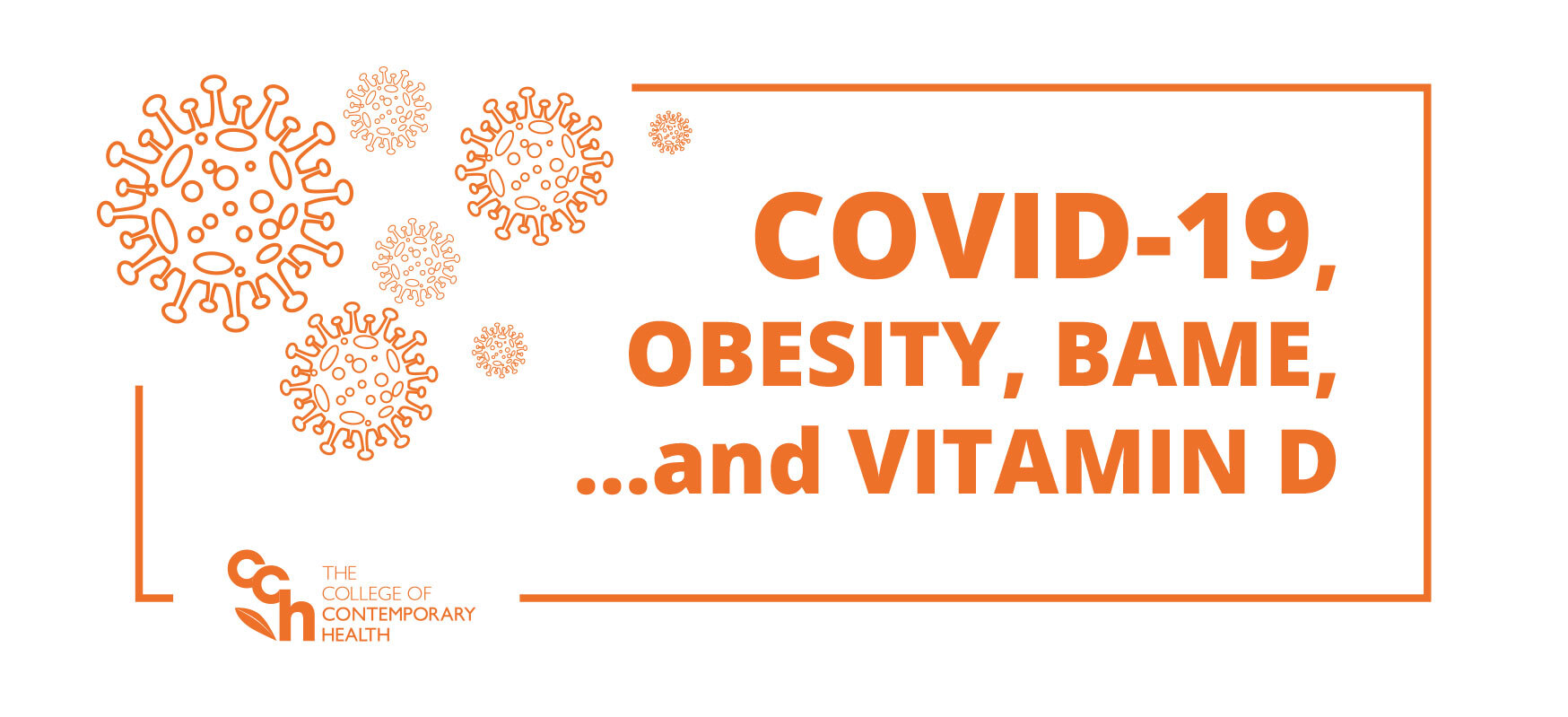
Covid-19, Obesity, BAME… and Vitamin D
Covid-19 and ethnicity
Over recent weeks, as the coronavirus pandemic has progressed, we have been inundated with data and statistics about the impact of the virus in a range of different countries, communities and demographic groups, but perhaps the most shocking are the numbers of people from black, Asian and minority ethnic (BAME) backgrounds who have died from Covid-19.
The numbers
In the UK, concern was first aired when it was reported that the first ten doctors to die from the virus were all from BAME groups (1), and that more than 60% of all healthcare workers to die from the coronavirus were BAME individuals (2). Early data on the ethnic breakdown of Covid-19 patients entering hospital revealed that 34% were of BAME heritage, compared to 14% of the population as a whole (3). A recent report from the Institute of Fiscal Studies (IFS) revealed that people of British Black African heritage are 3.5 times more likely to die from Covid-19 compared with the white population; people of Black Caribbean heritage 1.7 times more likely and British Pakistanis 2.7 times more likely (2).
On the other side of the Atlantic, a similar picture has emerged with regard to African-Americans, who have accounted for 27% of Covid-19 deaths (a mortality rate 2.6 times that of white Americans) according to a recent report (4). These disparities in death rates between ethnic groups are likely to be due to a complex interplay of a multitude of factors which influence health behaviours, immune profiles, infection risk and health outcomes (5).
Social, economic and health issues
In the US, attention has focused on the fact that African Americans are often socioeconomically disadvantaged, live in more densely populated areas and more crowded conditions. This potentially increases transmission of the virus. They are also more likely to be employed in key worker roles, and less likely to be able to work from home, so have greater risk of infection (6). In addition, African-Americans have higher incidence of obesity, type 2 diabetes mellitus (T2DM) and hypertension than their white counterparts (7, 8) – these have been identified as the three biggest risk factors for severe Covid-19 illness after age (9).
These socioeconomic and health issues are similar for BAME communities in the UK. They often live in densely populated areas and sometimes live in extended, multi-generational cohabiting families, which could increase infection of vulnerable members of the community. People from BAME backgrounds also represent a disproportionate number of medical and support staff in the NHS, so may be more exposed to the SARS-CoV-2 virus (2). The Black African / Caribbean population has the highest rate of obesity of all ethnic groups in the UK (10), but the most significant health issue affecting BAME groups is T2DM, which is of course a significant risk factor for Covid-19 morbidity and mortality. Black and South Asian populations in the UK have 3-5 times the prevalence of T2DM compared to the white population, and are diagnosed on average 10-12 years younger (11). Clearly there are a number of social, economic and health factors which may be contributing to increased risk of infection and increased severity of Covid-19 in BAME populations, but there is one
further factor that should be considered – the possible role of vitamin D deficiency in vulnerability to Covid-19.
Vitamin D
Vitamin D is essential for regulation of immune function, and has been shown to reduce the production of pro-inflammatory cytokines that are associated with lung damage caused by acute viral respiratory infections such as influenza and Covid-19 (12). In fact, supplementation with vitamin D reduces the risk of respiratory infection, particularly in people with low vitamin D status (13). Vitamin D is synthesised under the skin following exposure to UVB radiation from sunlight, so individuals who get insufficient sunlight are at risk of vitamin D deficiency. This is a particular issue during winter in countries further from the equator, when sunlight has insufficient UVB for vitamin D synthesis. People with darker skin colour who live in these countries, which includes many BAME communities, are at even greater risk, as are those who rarely go outside or expose very little skin to the sun (14).
It is therefore very interesting to note that the current coronavirus pandemic took hold at the end of winter in the northern hemisphere (the time of year when vitamin D status is at its lowest) and the countries most affected by the virus are in the northern hemisphere, above 35 degrees latitude (15). At the same time, countries at the end of summer in the southern hemisphere, such as Australia and New Zealand, have fared very well. Furthermore, a cross-sectional analysis of countries in Europe has shown a statistically significant correlation between population vitamin D levels and Covid-19 cases and deaths (16).
Vitamin D deficiency could therefore be contributing to the disproportionate number of BAME individuals who are succumbing to Covid-19. It is also interesting to note that vitamin D status tends to fall with age, particularly for older people in care homes, and with rising BMI (17). Obesity is strongly associated with vitamin D deficiency, although why this is the case is not clear. The leading theory is that dysfunctional adipose tissue in obesity sequesters vitamin D and impairs its release so it is no longer bio-available (18). Vitamin D plays an essential role in glucose homeostasis, insulin sensitivity and regulation of adipokines such as leptin, as well as inflammatory cytokines (19). Vitamin D insufficiency may therefore be involved in mediating insulin resistance and inflammation associated with obesity.
Vitamin D deficiency could therefore be a part of the Covid-19 pandemic jigsaw, contributing to the vulnerability of people with obesity as well as those of BAME heritage. Routine vitamin D screening could be introduced for hospitalised Covid-19 patients, and BAME health and social care workers, especially those with excess weight, to establish whether there is a link and to provide the opportunity to correct any deficiencies as part of treatment and prevention measures.
Conclusion
Vitamin D is just one of many factors, as discussed here, which might contribute to the vulnerability of BAME individuals to Covid-19, but it could be contributing to a toxic combination of factors, including obesity and other comorbidities, that is putting our BAME communities, particularly those individuals working on the frontline of health and social care, at very high risk of severe Covid-19 illness. Unfortunately, the risk to BAME health workers could have been predicted, and measures to protect them put in place, as the mortality rate for the BAME population for the 2009 influenza A (H1N1) epidemic in England was nearly twice that of the white population (20). It is vital that research is undertaken to determine the underlying causes of the unacceptably high price BAME communities are paying in the current pandemic. In the meantime, health and social care workers of BAME heritage, especially those with excess weight, should be afforded the protection they merit as key workers at higher risk from Covid-19, including ensuring healthy vitamin D status.
References
- Siddique H (2020) UK government urged to investigate coronavirus deaths of BAME doctors. The Guardian. Published 10 April 2020. https://www.theguardian.com/society/2020/apr/10/uk-coronavirus-deaths-bame-doctors-bma
- Boyd C (2020) Death rate among black and Asian Brits is more than 2.5 TIMES higher than that of the white population, reveals stark analysis by Institute of Fiscal Studies. Mail Online. Published 1 May 2020. https://www.dailymail.co.uk/news/article-8276097/Clear-disparity-ethnic-groups-Covid-19-deaths-IFS-study.html
- Intensive Care National Audit Research Centre (2020) ICNARC report on COVID-19 in critical care. Published 17 April 2020. https://www.icnarc.org/Our-Audit/Audits/Cmp/Reports
- APM Research Lab (2020) The colour of coronavirus: Covid-19 deaths by race and ethnicity in the US. Published 1 May 2020. https://www.apmresearchlab.org/covid/deaths-by-race
- Pareek M, Bangash MN, Pareek N, Pan D, Sze S, Minhas JS, Hanif W, Khunti K (2020) Ethnicity and Covid-19: an urgent public health research priority. The Lancet. 395(10234): 1421-1422.
- Gupta S (2020) Why African-Americans may be especially vulnerable to COVID-19. Science News. Published 10 April 2020 https://www.sciencenews.org/article/coronavirus-why-african-americans-vulnerable-covid-19-health-race
- Centers for Disease Control and Prevention (2020) National diabetes statistics report 2020. https://www.cdc.gov/diabetes/pdfs/data/statistics/national-diabetes-statistics-report.pdf
- American Heart Association (2016) High blood pressure and African Americans. https://www.heart.org/en/health-topics/high-blood-pressure/why-high-blood-pressure-is-a-silent-killer/high-blood-pressure-and-african-americans
- Richardson S, Hirsch JS, Narasimhan M, Crawford JM, McGinn T, Davidson KW, and the Northwell COVID-19 Research Consortium (2020) Presenting Characteristics, Comorbidities, and Outcomes Among 5700 Patients Hospitalized With COVID-19 in the New York City Area. JAMA. Published online 22 April 2020. doi:10.1001/jama.2020.6775
- UK Government (2019) Ethnicity facts and figures. https://www.ethnicity-facts-figures.service.gov.uk/health/diet-and-exercise/overweight-adults/latest
- Goff LM (2019) Ethnicity and Type 2 diabetes in the UK. Diabetic Medicine. 36: 927-938 12
- Greiller CL and Martineau AR (2015) Modulation of the Immune Response to Respiratory Viruses by Vitamin D. Nutrients. 7: 4240-4270
- Martineau AR, Jolliffe DA, Hooper RL, et al. (2017) Vitamin D supplementation to prevent acute respiratory tract infections: systematic review and meta-analysis of individual participant data. BMJ. 356: i6583. doi:10.1136/bmj.i6583
- National Institute of Health and Care Excellence (2018) Vitamin D deficiency in adults – treatment and prevention. https://cks.nice.org.uk/vitamin-d-deficiency-in-adults-treatment-and-prevention#!backgroundSub:2
- Rhodes JM, Subramanian S, Laird E, Kenny RA (2020) Editorial: low population mortality from COVID-19 in countries south of latitude 35 degrees North supports vitamin D as a factor determining severity. Aliment Pharmacol Ther. 00: 1–4. DOI: 10.1111/apt.15777
- Ilie PC, Stefanescu S, Smith L et al. (2020) The role of Vitamin D in the prevention of Coronavirus Disease 2019 infection and mortality. PREPRINT (Version 1) available at Research Square https://doi.org/10.21203/rs.3.rs-21211/v1
- Vimaleswaran KS, Berry DJ, Lu C, et al. (2013) Causal relationship between obesity and vitamin D status: bi-directional Mendelian randomization analysis of multiple cohorts. PLoS Med. 10: e1001383. doi:10.1371/journal.pmed.1001383
- Pramono A, Jocken J, Blaak E (2019) Vitamin D deficiency in the etiology of obesity related insulin resistance. Diabetes Metab Res Rev. 35: e3146 https://doi.org/10.1002/dmrr.3146
- Zakharova I, Klimov L, Kuryaninova V, Nikitina I, Malyavskaya S, Dolbnya S, Kasyanova A, Atanesyan R, Stoyan M, Todieva A, Kostrova G and Lebedev A (2019) Vitamin D Insufficiency in Overweight and Obese Children and Adolescents. Front. Endocrinol. 10: 103. doi: 10.3389/fendo.2019.00103
- Zhao H Harris RJ Ellis J Pebody RG (2015) Ethnicity, deprivation and mortality due to 2009 pandemic influenza A(H1N1) in England during the 2009/2010 pandemic and the first post-pandemic season. Epidemiol Infect. 143: 3375-3383.
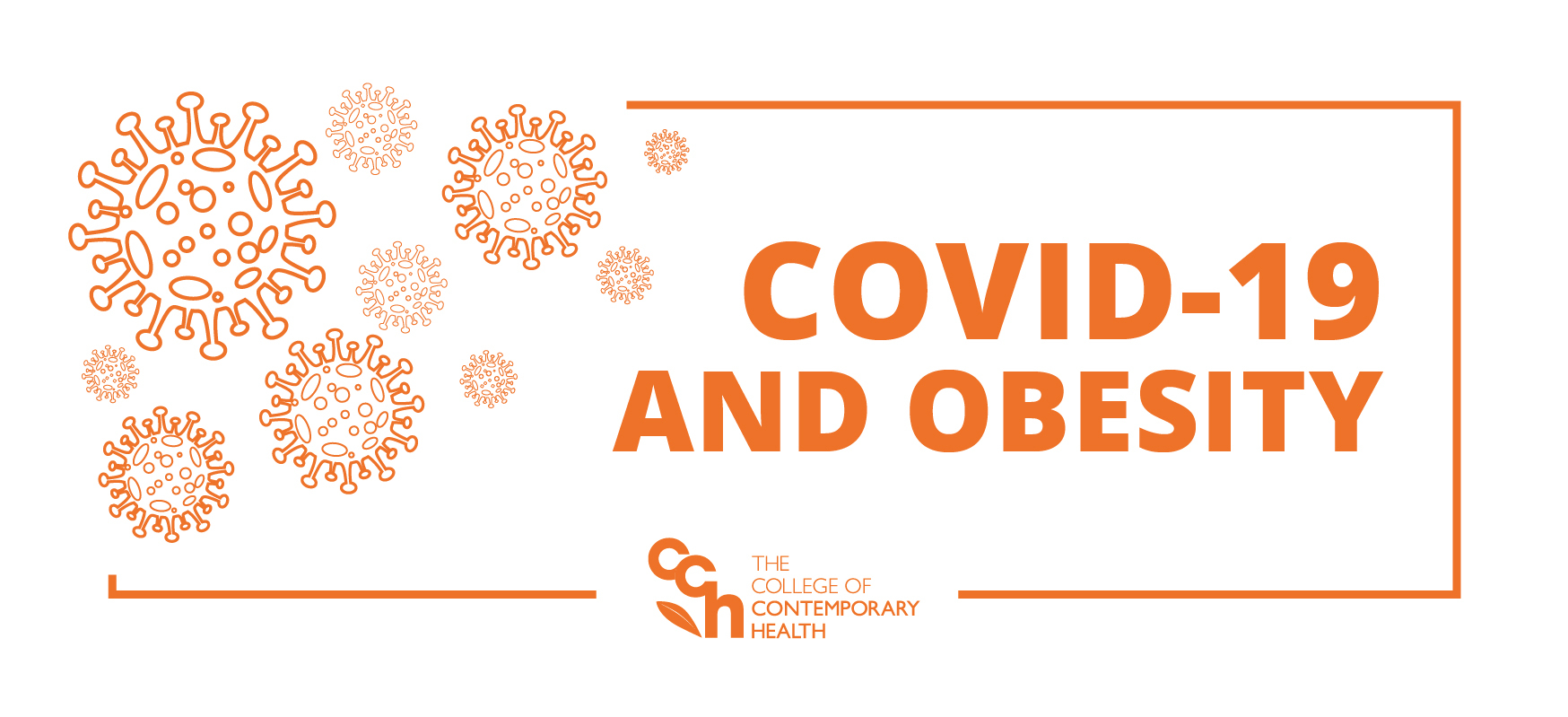
Covid-19 and Obesity
From the early days of the coronavirus epidemic in China, we have been aware that older adults and people with underlying health conditions, such as diabetes and cardiovascular disease, are at greatest risk of severe illness and mortality caused by the virus, SARS-COV-2.
But when the epidemic spread to Europe, it quickly became apparent that overweight and obesity are also major risk factors for becoming critically ill with Covid-19. This was first noted in Italy (1), then in the UK, where 73% of the first 5,500 critically ill patients had overweight or obesity (2), and then the US. A recent publication in the Journal of the American Medical Association showed that, of 5,700 patients hospitalised with Covid-19 in the New York City area, 42% had obesity (3). Another study showed that, once hospitalised, patients aged below 60 with BMI > 30 are twice as likely to need critical care compared with patients with a BMI < 30 (4).
Given that hypertension and type 2 diabetes are two of the common comorbidities of obesity, this revelation was not surprising, but it also raised the question of whether obesity is an independent risk factor for critical illness or death from Covid-19, or if it is due just to the comorbidities. Data from Arthur Simonnet and colleagues in France showed that, of the Covid-19 patients in ICU, the need for ventilation rose with BMI, and this was independent of age, diabetes and hypertension – indicating that excess body fat itself increases an individual’s vulnerability to Covid-19 (5). Simonnet’s findings are supported by reports from the US that significant numbers of younger people with obesity, but otherwise healthy, are being hospitalised (6).
So how can obesity result in a worsening of symptoms and greater risk of death from Covid-19? One way is simply the physical presence of fat stores in the upper abdomen, which causes compression of the diaphragm and lungs, compromising respiratory function. However, probably the key factor is the effect that obesity has on the immune system.
In individuals with obesity, visceral adipose tissue in the abdominal cavity produces inflammatory cytokines that cause a chronic low-grade inflammatory state throughout the body. It is unclear how this affects the response to the viral infection in the lungs, but one theory is that inflammation caused by obesity occupies the immune system’s resources, reducing its ability to mount an effective response against the virus.
On the other hand, it has also been proposed that this constant activation of the immune system means that it over-reacts to the virus, causing excess inflammation and damage in the lungs (7).
There is also evidence that leptin may play an important role. Leptin is a hormone produced by adipose tissue, which is best known for its effects on reducing appetite by binding to receptors in the brain. In people with obesity, the CNS becomes resistant to leptin, so blood levels of leptin are high but it is ineffective at reducing appetite. However, T-lymphocytes, which are involved in the cell-mediated response to viral infections, also have leptin receptors and leptin deficiency or resistance can lead to dysregulation of cytokine production and increased susceptibility toward infectious diseases and inflammatory responses (8).
Research into the relationship between obesity and influenza viruses has been ongoing since the H1N1 ‘swine ‘flu’ influenza pandemic in 2009, and has shown that not only are individuals with obesity at increased risk of severe illness from the influenza virus, but they also respond less well to vaccines (9), and they are potentially more infectious because they shed virus for longer when infected (10).
When we add all this evidence up, it is clear that people with obesity are very vulnerable, not only to the current coronavirus, but also to influenza viruses and future viral pandemics.
Rising global obesity rates could be contributing to the spread of infection and are certainly putting added strain on already-stretched health services, highlighting the urgent need to tackle obesity and reverse this trend – something which governments and health systems around the world have so far failed to do.
Sources
- Mills J (2020) Obese people are ‘at higher risk from coronavirus’. Metro. Published online 23 March 2020. https://
metro.co.uk/2020/03/23/obese-people-higher-risk-coronavirus-12444395/ - Intensive Care National Audit Research Centre (2020) ICNARC report on COVID-19 in critical care. Published 17 April 2020. https://www.icnarc.org/Our-Audit/Audits/Cmp/Reports
- Richardson S, Hirsch JS, Narasimhan M, Crawford JM, McGinn T, Davidson KW, and the Northwell COVID-19 Research
Consortium (2020) Presenting Characteristics, Comorbidities, and Outcomes Among 5700 Patients Hospitalized With
COVID-19 in the New York City Area. JAMA. Published online 22 April 2020. doi:10.1001/jama.2020.6775. - Lighter J, Phillips M, Hochman S, Sterling S, Johnson D, Francois F, Stachel A (2020) Obesity in patients younger than 60
years is a risk factor for Covid-19 hospital admission. Clinical Infectious Diseases. https://doi.org/10.1093/cid/ciaa415 - Simonnet A, Chetboun M, Poissy J, Raverdy V, Noulette J, Duhamel A, Labreuche J, Mathieu D, Pattou F, Jourdain M,
Lille Intensive Care COVID-19 and Obesity study group (2020) High prevalence of obesity in severe acute respiratory
syndrome coronavirus-2 (SARS-CoV-2) requiring invasive mechanical ventilation. Obesity (Silver Spring). Published 9
April 2020. doi: 10.1002/oby.22831. - Rabin RC (2020) Obesity Linked to Severe Coronavirus Disease, Especially for Younger Patients. New York Times. Pub-
lished 16 April 2020. https://www.nytimes.com/2020/04/16/health/coronavirus-obesity-higher-risk.html - Sattar N, McInnes IB, McMurray JJV (2020) Obesity a Risk Factor for Severe COVID-19 Infection: Multiple Potential
Mechanisms. Circulation. Published 22 Apr 2020. https://doi.org/10.1161/CIRCULATIONAHA.120.047659 - Maurya R, Bhattacharya P, Dey R and Nakhasi HL (2018) Leptin Functions in Infectious Diseases. Front. Immunol.
9: 2741. doi: 10.3389/fimmu.2018.0274. - Green WD, Beck MA (2017) Obesity Impairs the Adaptive Immune Response to Influenza Virus. Ann Am Thorac Soc.
14: S406-S409. - Maier HE, Lopez R, Sanchez N, Ng S, Gresh L, Ojeda S, Burger-Calderon R, Kuan G, Harris E, Balmaseda A, Gordon A
(2018) Obesity Increases the Duration of Influenza A Virus Shedding in Adults. J Infect Dis. 218(9): 1378-1382.

‘’I am more confident in my work with patients’’ – says Divya, CCH Master’s Graduate
1. What inspired you to study obesity care and management?
I work as part of a team in Bristol that supports childhood cancer survivor’s long term after the end of their treatment. We as a team perform a holistic needs assessment each time they attend, and promoting healthy lifestyle routines are central to our discussions. I often support patients wanting to make healthy changes hence my decision to do further study in this area with a particular focus on obesity care as this is something I frequently help patients with.
2. Were there any obstacles to studying with CCH? What were the decisive factors that made you feel that CCH was the right choice?
The only obstacle I encountered through my studies was obtaining funding for each module. I was particularly interested to study with CCH as their programme was flexible and based on distance learning which suited me best.
3. What have you enjoyed the most while studying your MSc in Obesity Care and Management? Why exactly an MSc?
I particularly enjoyed the networking opportunities. With distance learning, you can meet other health care professionals working globally and I found it interesting to share practice. I have always enjoyed further academic work alongside my job, and after a few modules with CCH, I decided that getting the full MSc would be beneficial to my learning and practice with patients. I now have a solid foundation of evidence-based learning in obesity care so I now know that the work I am doing with patients is valid.
4. What has changed most in your practice since starting your studies?
Since my learning at CCH I have broadened my knowledge and expertise in obesity care and management and I am more confident in my work with patients. I have also kept in contact with other professionals I met on the course and we are still able to share skills and practice which is great.
5. What exceeded your expectations while studying at CCH?
During my studies, I was surprised with how I managed to stay motivated and I think the course content and activities were a big part of this. Each week there was a range of activities to get on with and these utilised many platforms such as powerpoint presentations, podcasts, journals, and videos.
6. What is the main reason you would recommend CCH and their Obesity Care and Management courses to your colleagues?
I would recommend courses with CCH for the opportunity to network with other professionals and also for the flexibility available for learning. The content is accessible around the clock so busy health care professionals can complete their learning when it’s convenient for them. The content is so varied and is based on the most up to date evidence-based material. I thoroughly enjoyed my studies and would recommend the MSc for any health care professionals working within public health and health promotion.
Begin your Postgraduate Certificate in Obesity Care and Management!
Apply here: https://www.contemporaryhealth.co.uk/apply/
